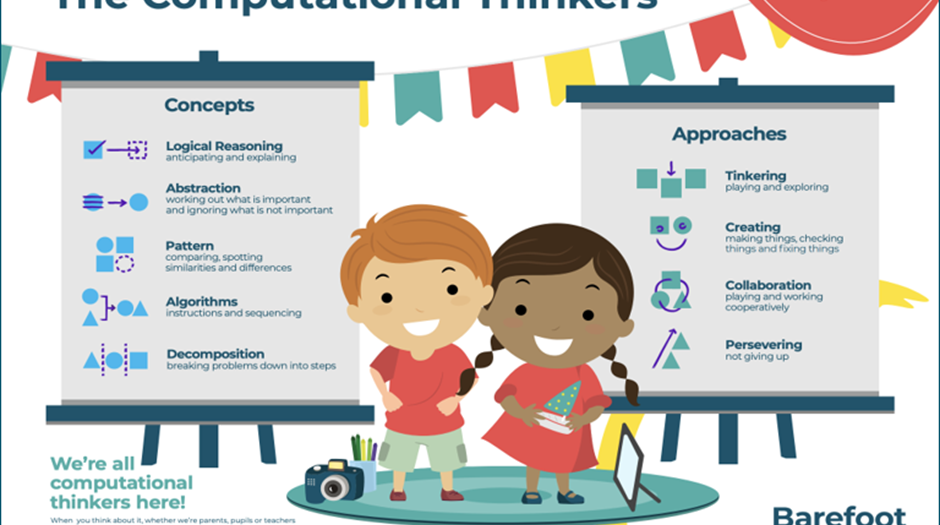13 March 2022
EYFS Barefoot Workshop

As a Barefoot Ambassador for many years, I finally decided to take the plunge and deliver the new EYFS workshop. Currently, I am a year 6 teacher and UKS2 Phase Leader, so you can imagine how terrifying this was – a million miles away from EYFS I hear you say! As a Computing Lead, I knew that delivering this would not only support those attending, but that it would give me a deeper insight into the EYFS curriculum. This term, I am planning to deliver some of the activities in my own school as I believe they are brilliant!
The workshop begins with on overview of what Barefoot is all about then delves deeper by demonstrating a range of cross-curricular unplugged activities, which are all linked to the EYFS framework, and explore computational thinking. No concept or approach is shied away from with areas such as algorithms, sequences, patterns and abstraction being covered. The resources, as usual, have alongside them a lesson plan and ppt, and are divided into the four seasons: Autumn, Winter, Spring and Summer. As with previous Barefoot workshops, teachers participate in the session and have a go at the activities shown using Padlet – well worth a look at if you have never used!
The thing I like most is the fact that the unplugged activities are nothing new (the EYFS teachers are probably already doing something similar already), but the massive difference is that computational thinking has been linked in explicitly and seamlessly. For example, in the Spring resources, there is a Sequencing Seeds activity where the children put picture cards into an order: I would imagine most EYFS classes discuss the life cycle of plants or growth. Therefore, this could be slotted in easily as part of that planning, like in our Reception classes, who have been planting in our Secret Garden. As a teacher who maybe lacks confidence in this area, this it is reassuring to know you are doing something right, and throughout the workshop, I reinforced this with them. One feedback from the session was:
‘I was concerned that I wasn't doing enough computing in the EY but the things that I am doing are ok - it was nice to have that confirmed! Thank you!’
Such feedback tells me that this workshop is providing teachers with the skills and confidence they need to teach computing. Although, as we know, computing has been removed as such from the EYFS framework, computational thinking has not. This needs to be taught as it is a building block for KS1 and beyond. Often in my class, I refer to computational thinking skills in other subjects of the curriculum. This not only helps children remember them, it makes them understand them more deeply and see how vital they are in all areas of learning.
All-in-all, I would highly recommend you book this workshop, or any of the other Barefoot workshops, as they are excellent free CPD and provide you with a raft of cross-curricular, fun and creative activities which are written by teachers. Also, I think that they could be used in KS1 and KS2 as a starting point for computational thinking. Each activity can also be taken to a computer should you wish to do so i.e. Scarves for Snowmen could be completed in an Art Package too. Workshops are easy to book and are available on the Barefoot website:
https://www.barefootcomputing.org/primary-computing-workshops
I cannot wait to try out these resources in my school but I would love to hear from you:
Have you attended a workshop and what have you taken from it?
What resources have you used? Did you adapt them? How well did they fit into your curriculum map? What did the children think about them?
Any comments would be greatly appreciated!


Discussion
Please login to post a comment
Thank you so much for your feedback Jo and Gillian. It’s great to hear that Barefoot are helping the EY community with our resources and workshops.
I used some of the Barefoot EYFS materials in an Inset recently, and one of the practitioners has said she is using the activities and loving them. She has always felt apprehensive about computing before as she felt it was all about the devices, but the unplugged activities have given her the confidence to develop the computational thinking concepts in a manner that is already familiar to her. Part 2 of the Inset is next week so hopefully I’ll get some more positive feedback from practitioners!